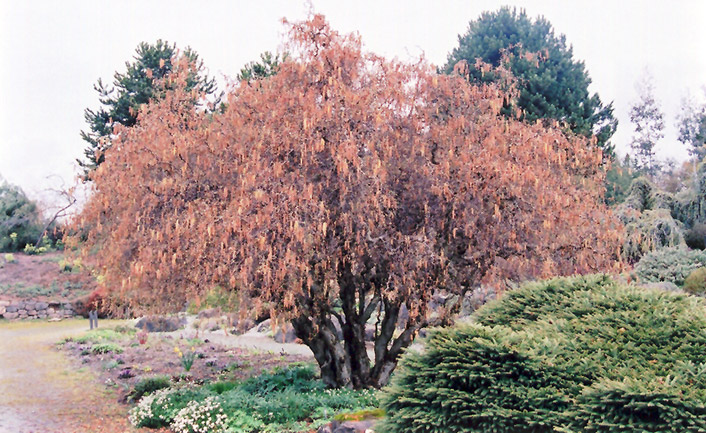Contorted Filbert
Corylus avellana 'Contorta'
Height: 7 feet
Spread: 5 feet
Sunlight:
![]()
![]()
Hardiness Zone: 5
Other Names: Henry's Lauder's Walking stick
Description:
A very popular accent shrub with twisted, contorted branch growth; quite a strong accent in both summer and in winter when the bare branches are at peak visibility; for solitary use only, cut branches are excellent in floral arrangements
Ornamental Features
Contorted Filbert is draped in stunning brown catkins hanging below the branches from late winter to early spring before the leaves. The flowers are excellent for cutting. It has dark green deciduous foliage. The crinkled round leaves turn yellow in fall. The twisted dark brown bark and brown branches are extremely showy and add significant winter interest.
Landscape Attributes
Contorted Filbert is a multi-stemmed deciduous shrub with a more or less rounded form. Its relatively coarse texture can be used to stand it apart from other landscape plants with finer foliage.
This is a high maintenance shrub that will require regular care and upkeep, and is best pruned in late winter once the threat of extreme cold has passed. Gardeners should be aware of the following characteristic(s) that may warrant special consideration;
- Suckering
Contorted Filbert is recommended for the following landscape applications;
- Accent
- General Garden Use
Planting & Growing
Contorted Filbert will grow to be about 7 feet tall at maturity, with a spread of 5 feet. It tends to be a little leggy, with a typical clearance of 1 foot from the ground, and is suitable for planting under power lines. It grows at a medium rate, and under ideal conditions can be expected to live for approximately 30 years.
This shrub does best in full sun to partial shade. It is very adaptable to both dry and moist locations, and should do just fine under average home landscape conditions. It is not particular as to soil type or pH. It is highly tolerant of urban pollution and will even thrive in inner city environments. This is a selected variety of a species not originally from North America.

